Main Content
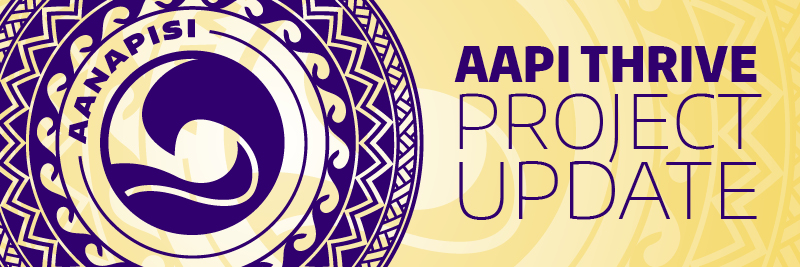
Volume 1, issue 3
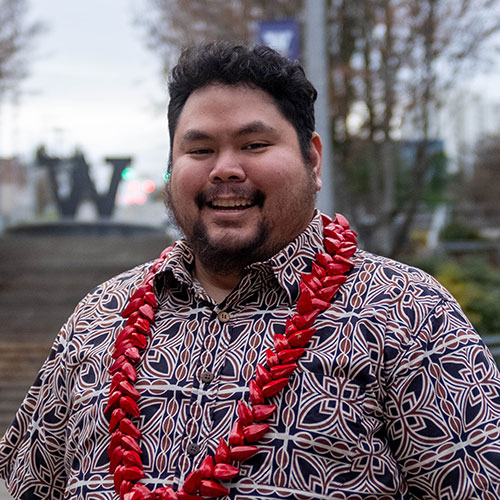
Director's Message
Talofa lava AAPI THRIVE aiga,
As the 2024–2025 academic year comes to a close, I want to take a moment to reflect on what has truly been a transformative and powerful spring quarter. Our community continues to grow in purpose, leadership, and cultural strength, and I am so proud of what we’ve built together.
This quarter was filled with powerful reminders of why AAPI THRIVE exists. From our Student Conference: Roots and Routes that spotlighted intergenerational stories and cultural performance, to our Wayfinder Mentors leading sessions on identity, mental health, and writing, we witnessed our students step boldly into leadership and solidarity. A special congratulations to AJ Pioquinto and Gabbie Quintinita, who represented UW Tacoma with excellence at APAHE 2025, presenting their workshop “Destigmatizing Mental Health with Student-Led Affirmations for Collective Healing and Liberation.” Their brilliance, vulnerability, and advocacy inspire us all.
This spring, we also held space for deep learning and cultural healing, through our Mental Health Dialogue & Art Therapy event organized by Dr. Jenny Xiao, our inaugural Talanoa Series with Dr. David Palaita, and the AAPI THRIVE Faculty Learning Community Showcase on inclusive teaching and linguistic justice. Each gathering wove together threads of advocacy, identity, and care, reminding us that thriving means centering our stories in every space we enter.
As we celebrate the close of the year, I want to offer heartfelt gratitude to two incredible champions of AAPI THRIVE. Patrick Pow, Vice Chancellor for Information Technology, who is retiring, has been a steadfast advocate since the very beginning. His vision, generosity, and deep connection with students laid the foundation for what this program is today. And to Dr. Cassie Miura, who will be continuing her journey at San Francisco State University as Assistant Professor of Asian American Studies in the College of Ethnic Studies. We thank you for the mentorship, rigor, and care you’ve poured into our scholars and community. Your impact will be felt for years to come.
We wrapped the year with joy and community at our Ice Cream Social, honoring our cohort’s journey and welcoming their next chapter. Whether you’re graduating, continuing, or just getting started, know this, AAPI THRIVE is not just a program, it’s a movement, and you are part of it.
As one Samoan proverb reminds us:
"Ia e tausi le va."
"Cherish and nurture your relationships."
This wisdom speaks to the core of AAPI THRIVE. We are strongest when we take care of one another. Whether you are graduating, continuing, or just joining us, remember that this community is here for you, and you are always a part of it.
Ia manuia and may your summer be restful, joyful, and rooted in connection.
With deep gratitude and alofa,
Nestor Tupufia Enguerra Jr.
Director, AAPI THRIVE

Reflections on Patrick Pow
We asked Tanya Velasquez, Interim Vice Chancellor for Equity & Inclusion, to tell us a bit about retiring Vice Chancellor Patrick Pow.
What is a standout moment you shared with Patrick Pow?
The most important standout moment I've shared with Patrick is when we announced our receipt of the AANAPISI award. For years he persisted in the pursuit of the grant and laid the groundwork so that we could be successful with our application. It was a significant accomplishment that we could not have achieved without him. We thank him for all his support, networking, and tremendous vision for our campus.
What do you think his greatest contribution to AAPI THRIVE has been?
Patrick has given a great deal to the AAPI THRIVE Project, beginning with his endowment, which will ensure that outreach to Asian American, Native Hawaiian, and Pacific Islander students continues for years to come. He has also been a consistent champion and advocate in every space when it comes to elevating the needs and aspirations of our student body.
Do you have any funny or uplifting stories about Patrick Pow?
One of the things I will miss is seeing Patrick on campus each day because he is highly engaged with students. In fact, it's one of his most endearing qualities. Patrick is always willing to participate in student-led activities. For example, he has attended every Luau celebration sponsored by the PISA. Not only does he attend and co-sponsor the cost, but he will dance with the students and join their games. To date, I've never seen another campus leader do so at this event!
If you have anything else you'd like to mention, please do!
Patrick's leadership and contributions to our campus community have made a positive difference for our students, staff, and faculty. His work has not gone unnoticed, and we will miss him tremendously. Our hope is that he will attend future AAPI gatherings so he can see that we have honored his vision and wishes.
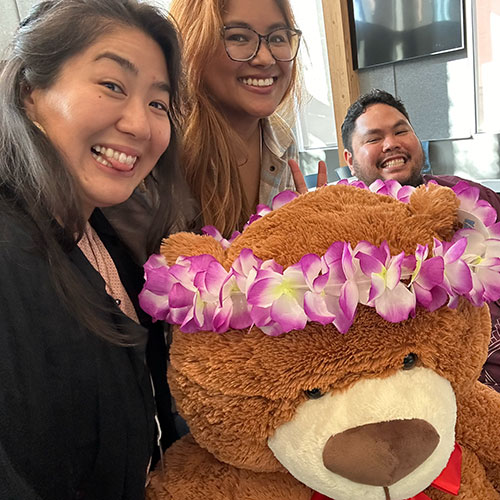
Reflections on Dr. Cassie Muira
We asked sophomore Eli Tupufia to tell us about his experiences with Professor Cassie Muira.
What is one lesson or discussion that really stood out to you?
What stood out most about Professor Miura was that she really pushed our writing abilities. She pointed out weaknesses in our arguments, presented tough questions our essay may not have answered, and overall emphasized improvement for the cohort through a supportive and encouraging class environment.
How did Cassie Miura help foster a supportive environment in the cohort?
Even though she pushed us academically, it wasn't overbearing or too strict and stressful. She gave us a lot of room to improve and paced our class according to our needs. The lectures were also always relevant to the cohort and class, and at times, she would positively engage students by questioning us, presenting relevant events or opportunities, and highlighting student accomplishments to include everyone in the conversation, which is beyond what many professors here do.
What’s one piece of wisdom or insight from Cassie Miura that you’ll carry forward?
The biggest takeaway from Professor Miura's classes was learning to have a growing mindset. This valuable skill has helped me improve on so many things beyond writing, and it will continue to help me grow as an individual.
Do you have any memorable or uplifting stories about Cassie Miura?
A small but funny moment I had with Professor Miura was when another student and I were in her office and we were discussing books, but I was not able to contribute since I don't really read books, and she was shocked (and disappointed) when I said that and then she gave me a few book recommendations to read. This memory may not seem important or considerable, but it sticks with me because of how comfortable students can be with her to be able to talk about other things like hobbies, and how even with those small things, she still encourages us students to do more.

Introducing Wayfinder Mentors
One of the resources that the AAPI THRIVE Scholars have access to is Wayfinder Mentors. The Wayfinders consist of fellow UW Tacoma students who have been trained to help students with academic or life skills. They can help with anything from time management to organization and planning skills, to figuring out how to read complicated scientific journal articles, and so much more. This year, we had five Wayfinders, Jannat Musawi (Social Welfare & Psychology, Junior), Gabbie Quintinita (Ethnic, Gender & Labor Studies, Junior), Jalina Sison (Mathematics, Sophomore), and our two graduating seniors, AJ Pioquinto (Psychology) and Ambre Fontana (Biomedical Sciences).
We wanted to give a special shoutout to AJ Pioquinto, as she has given so much of her time and energy to events and workshops throughout the year. She, along with Gabbie Quintinita, built and presented a mental health workshop at APAHE. In addition to her work for AAPI THRIVE, AJ is also the president of the Filipino American Student Association on campus and has helped throw multiple events through FASA. Now that she is graduating, AJ plans on taking a gap year before getting a master's degree. During her gap year, she plans on traveling and getting an entry-level psychology job. Thank you to AJ for all of your hard work these past two years and may your future hold happiness and success!
APAHE 2025
By Gabbie Quintinita
Some of the workshops I attended included panels of students and professors, a discussion of how burnout affects us, a panel of women in the higher education field (including the president of APAHE), and SFSU’s presentation of their program and the framework they use. It was positively overwhelming to see this many people truly care about AAPI work and advocating for AAPI education. Seeing what may be normal in California universities and colleges highlights the work and resources most Washington schools need. Funny enough, this entire conference made me start considering getting my master's degree in California.
As for the mental health workshop that we presented, I was sort of nervous that people wouldn’t show up, but we had a good 30-40 people. We discussed the use of affirmations as a mental health tool and the ways in which we could go against the stigma of mental health that is often in AAPI cultures. During our workshop, it was refreshing to have so many people actually participate and be engaged in the conversation, didn't have to just stare at them waiting for an answer. Many of our participants were willing to share some of their mental health experiences, both past and present ones, showing that being vulnerable and talking about mental health is normal. After making our affirmation cards, participants shared what they wrote and explained sort of the backstory behind it. This workshop also allowed us to share our experiences within AAPI THRIVE and our student organizations, shedding light on what it’s like in Washington. Afterward, a few students came up to us asking more questions or wanting our LinkedIn or social media. It was very heartwarming to feel a sense of community in a space that was created for us.
AAPI THRIVE Events
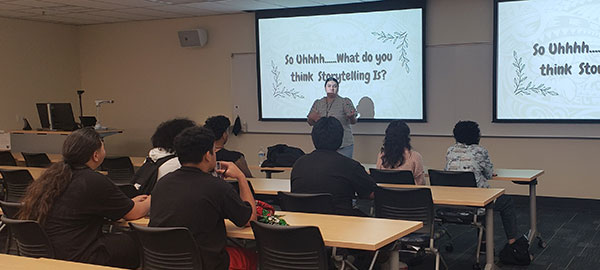
Annual Student Conference
On April 5th, we had our second Annual Student Conference, and this was the first Student Conference planned almost entirely by the Wayfinder Mentors. The theme was Roots and Routes: The Impact of the Stories that Bind Us, with the goal of exploring how our narratives shape our communities and build bridges between cultures. The conference was open to everyone: students at the university and high school levels, community members, family members of the dancers, and AAPI allies.
The conference included cultural performances by Guma’Imahahe, a Chamorro dance group whose mission is to share and preserve the Chamorro culture through song, dance, chant, and language. They performed three dances, some of which had 40 dancers performing, with dancers of all ages. The second cultural performance was done by the Tautua Group from Mount Tahoma High School. The Tautua Group consists of high school students and one of their coaches is Exita Lealofi, a UW Tacoma alumna. The final performance was done by the Viet Club from Mount Tahoma High School, who performed a traditional fan dance and a lion dance.
Accompanying the performances were four workshops that the attendees could choose from. The workshops covered a range of topics, from Exita Lealofi's workshop on storytelling to Paolo Laraño’s workshop on mental health to the RSO panel featuring FASA, PISA, MESAA, and MAPS, and two of our Wayfinders, AJ and Gabbie taught a traditional Filipino script, Baybayin.
Finally, the conference attendees heard from our keynote speaker, Maricres Castro. Maricres is the Commissioner for Immigrant and Refugee Affairs for the City of Tacoma, the Mental Health Program Manager for APCC, and the co-founder of Silviyana & Co. She spoke about her experience being a part of the AAPI community and how her perspective on her culture has changed from when she was younger to now.
Spring 2025 Quarter Mental Health Event
On May 1st, we were visited by two panelists, Sala Tauanu’u Afalava (MA. LMHC) and Katrina Van Strien (ATR P.LMHCA) to talk about the stigma behind mental health, the importance of the diversity of therapists, and highlight the low number of AAPI therapists. The panelists talked about how they got into the field, and the different types of therapy, with a focus on art therapy. To show the attendees how art therapy can help, the panelists did an art therapy exercise called neurographica. Neurographica is a method that uses drawing to help the person understand their thoughts and feelings. For the exercise, the attendees were asked to set an intention beforehand and then draw one continuous line scribbled on the paper. Then, they were asked to color in the intersections and reflect on the exercise.

Faculty Learning Community (FLC) Showcase
On May 9th, faculty from several different disciplines presented about inclusive teaching and how they incorporate Asian American, Native Hawaiian, and Pacific Islander experiences and linguistic justice into courses they are currently teaching or plan to teach. The theme this year was Linguistic Justice, with three objectives to guide their teaching or research. The first objective was Application, where faculty had to model how they've integrated a new understanding of AA&PI student experiences and linguistic justice through inclusive teaching practices, writing instruction, and/or assessment. The second objective was Relevancy, requiring them to successfully explain why engaging in this kind of work matters. The last objective was Advocacy and Leadership, where FLC members had to demonstrate confidence when speaking publicly about how to support Asian American, Native Hawaiian, and Pacific Islander student success.

Talanoa Series Event
May 12th marked the first year of our Talanoa Series. The Talanoa Series was created to establish unity, recognition, and connections with other Pacific Islander/Oceania students, faculty, and programs. For our first year, we welcomed Dr. David Ga’oupu Matthew Palaita, the chair of the Department of Interdisciplinary Studies at the City College of San Francisco.
Dr. Palaita’s talk entitled, “VASA (Ocean): The Space that is Sacred--An Interdisciplinary & Decolonial Framework for Critical Pacific Islands & Oceania Studies,” explored the power of Pasefika/Oceania languages in a place like higher education. The talk shared the story of City College of San Francisco students and their movement to create a new academic major, highlighting the importance of Pasefika knowledge in the world of education, in our schools, and in our classrooms.
The talk also included a traditional Samoan cultural opening ceremony called Ava, which honored our elders and leaders of the community, and a traditional Samoan closing dance called Taualuaga. Both ceremonies were performed by the Tautua Group from Mount Tahoma High School.
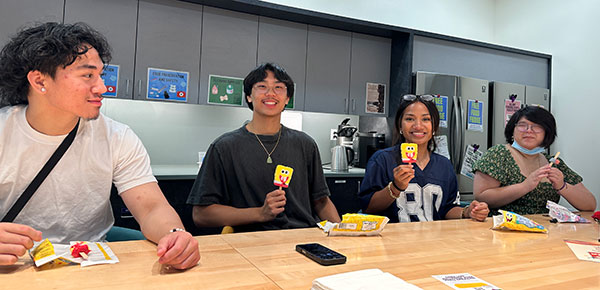
Ice Cream Social
On May 30th, we celebrated the end of the year and the success of our THRIVE scholars cohort with an Ice Cream Social. Over 50 people showed up to get ice cream, from our scholars to other students, faculty members, and even staff! We honored our soon-to-be sophomores with a slideshow featuring AAPI THRIVE events from the past year. Some of our cohort members even spotted themselves in the images!
AAPI THRIVE Project Update
- Spring 2025
- Winter 2025
- Autumn 2024
